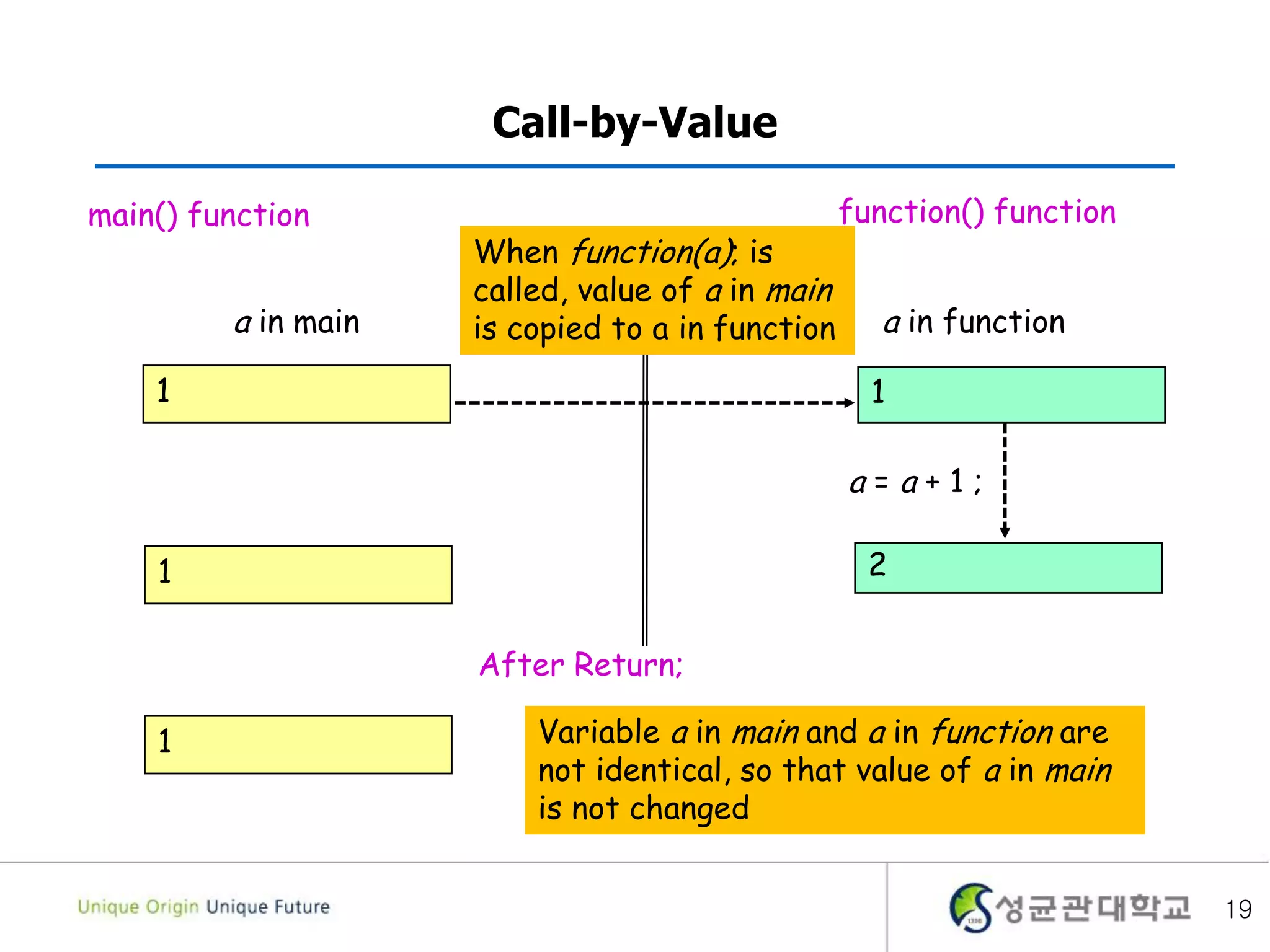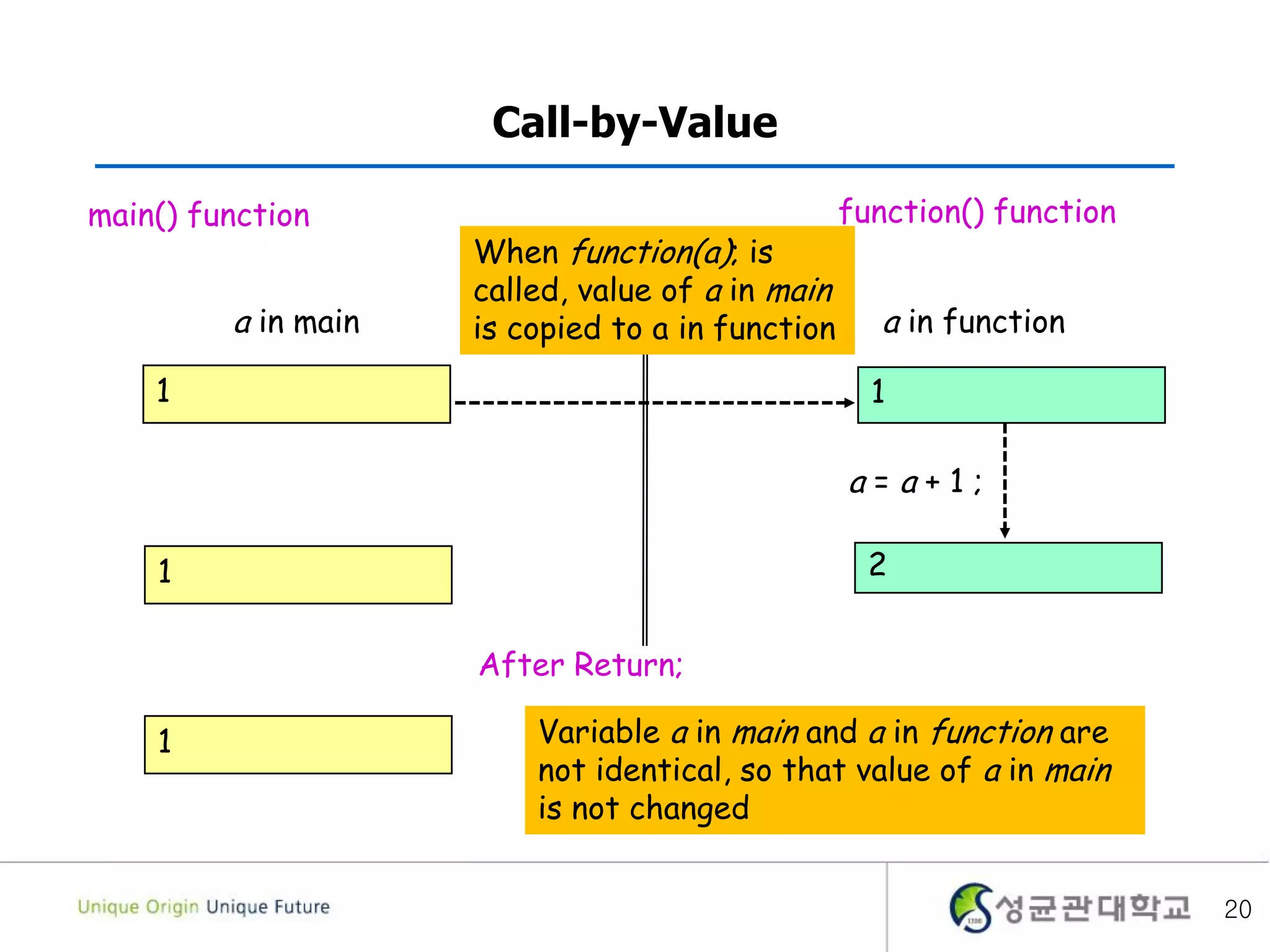The document discusses pointers in C programming. Some key points:
- Pointers store the address of a variable in memory. Pointer variables hold the address of other variables.
- To access the value of the variable a pointer points to, you dereference the pointer using *.
- Pointer variables are passed by value like other variables in C, so any changes made to the pointer or value it points to inside a function will not be reflected outside the function.
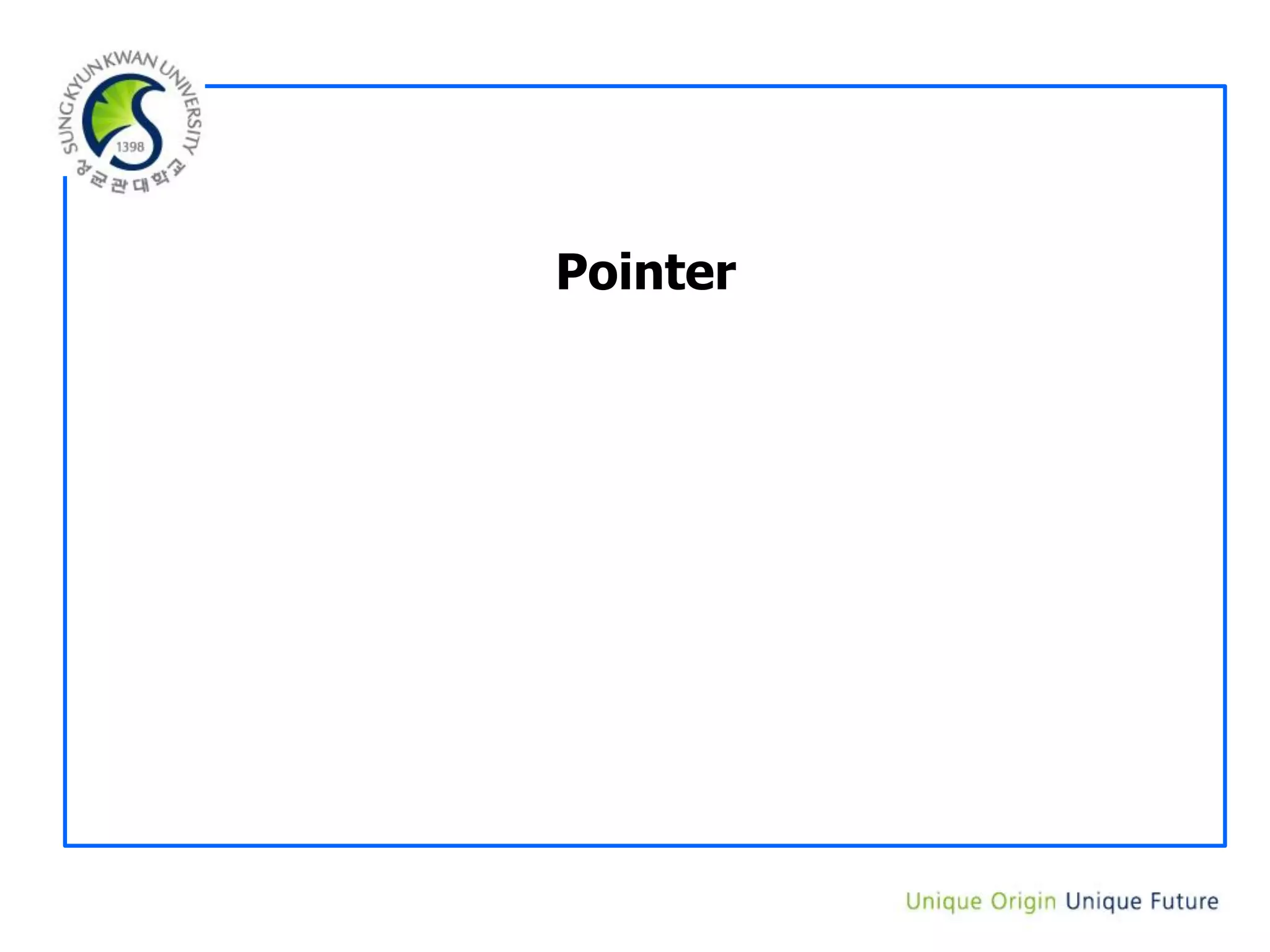
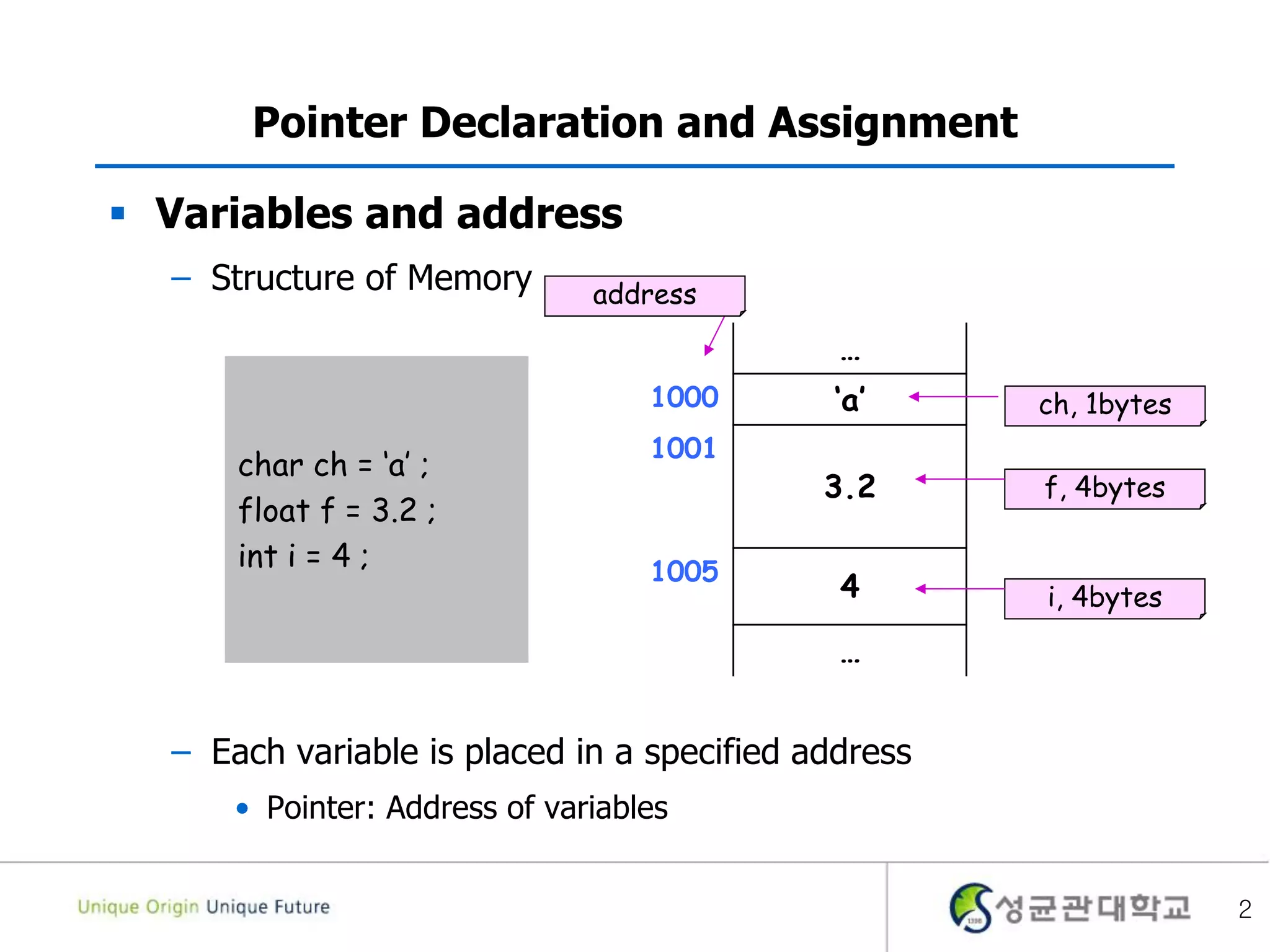
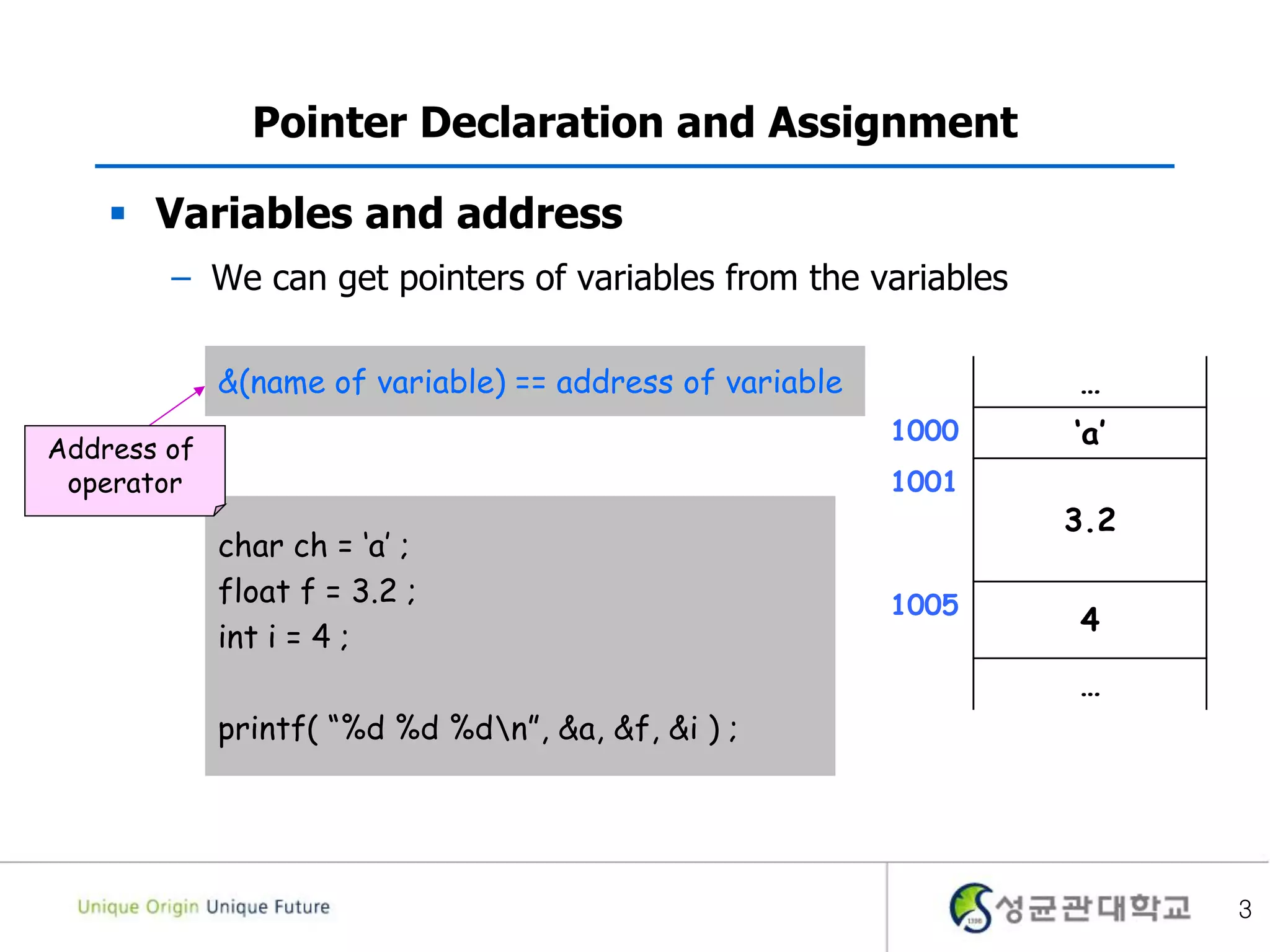
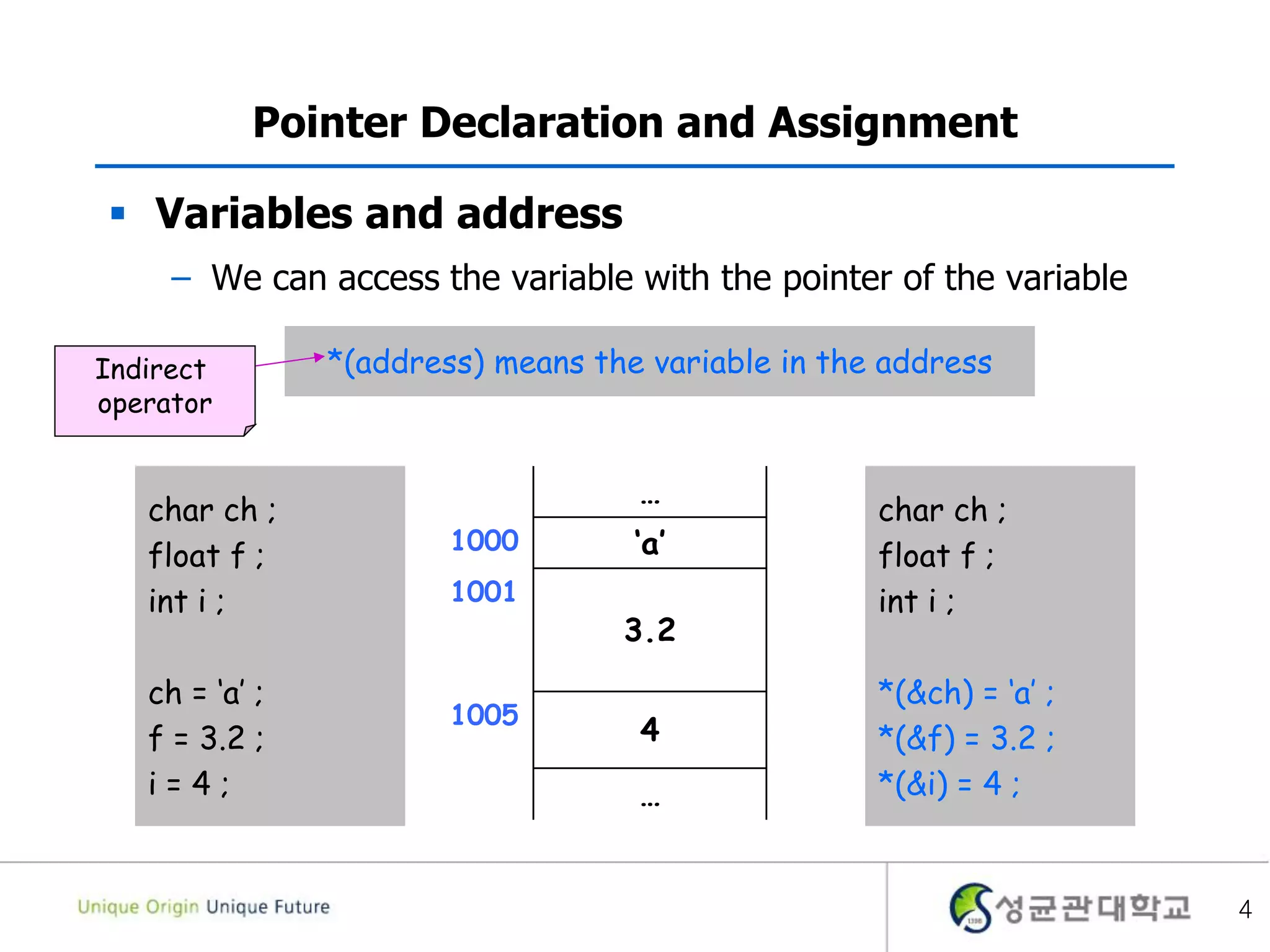
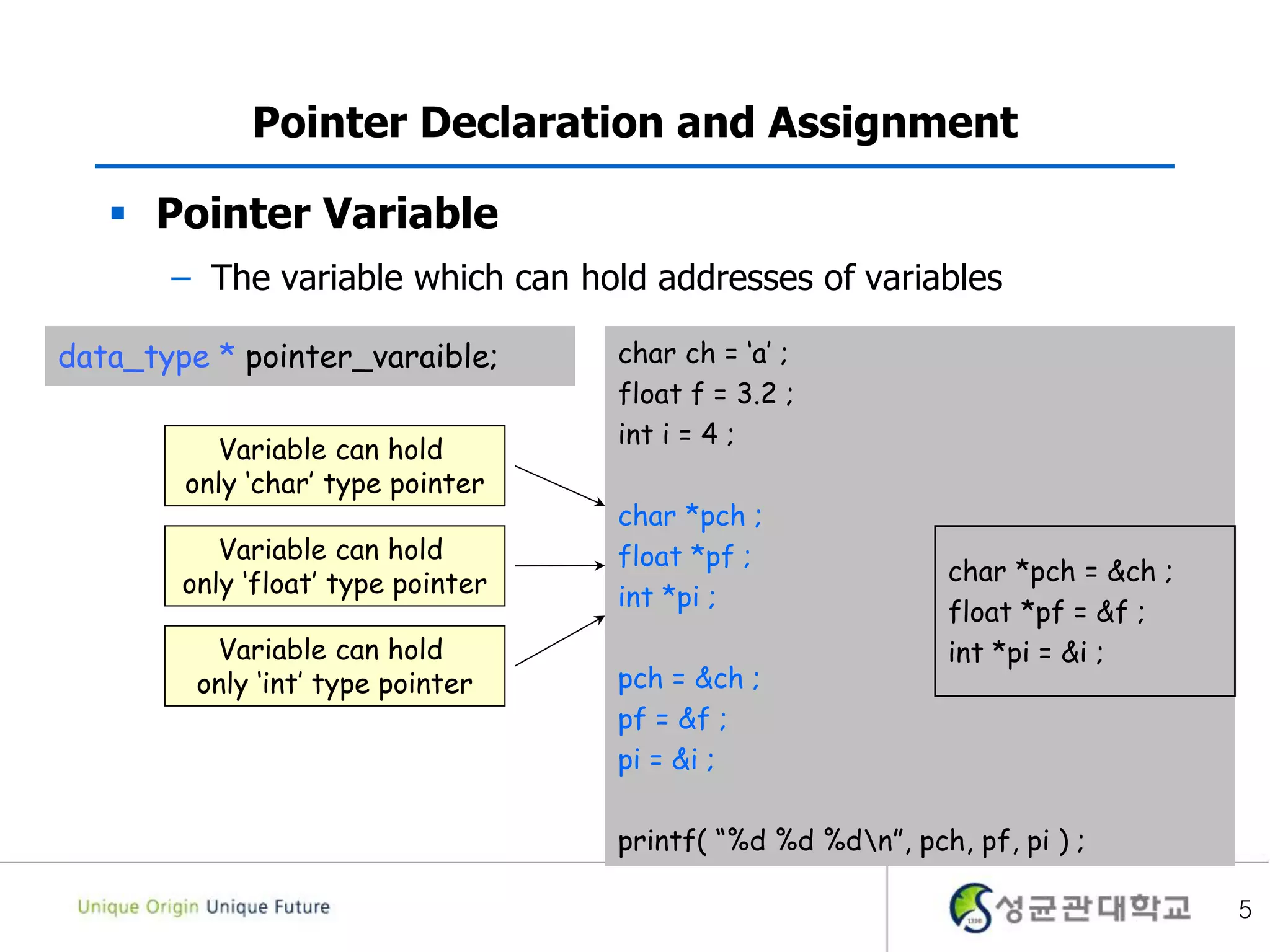
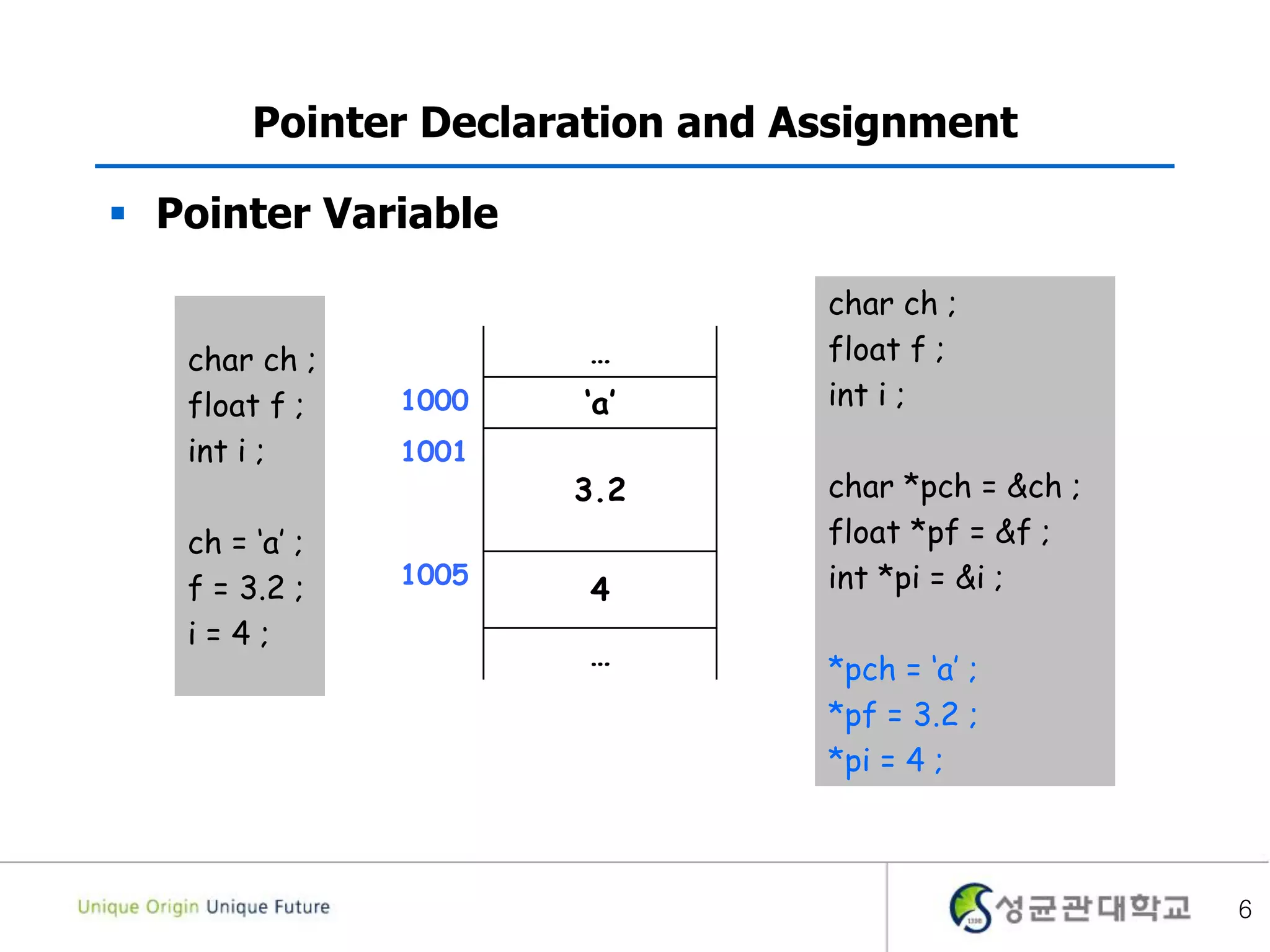
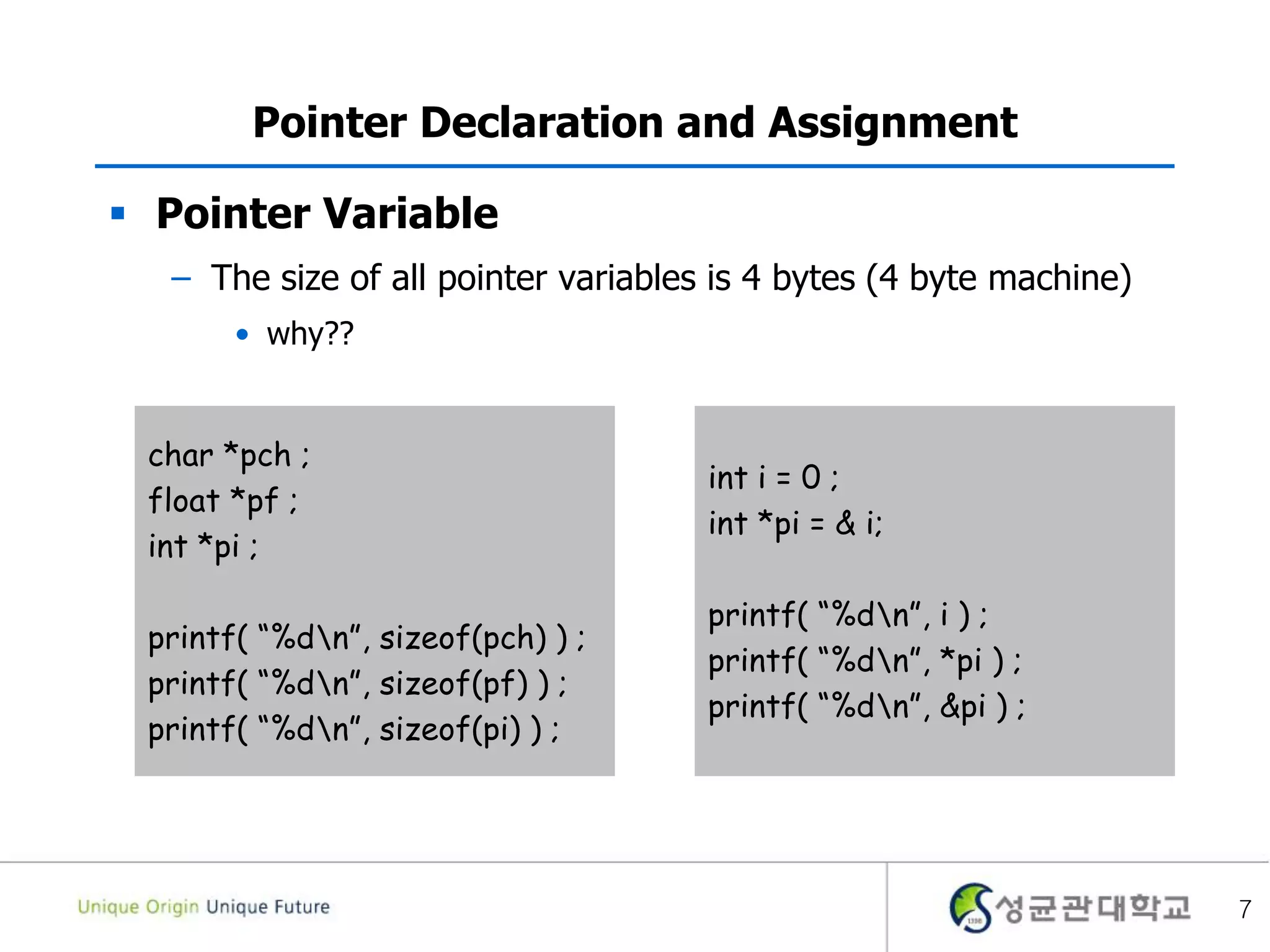
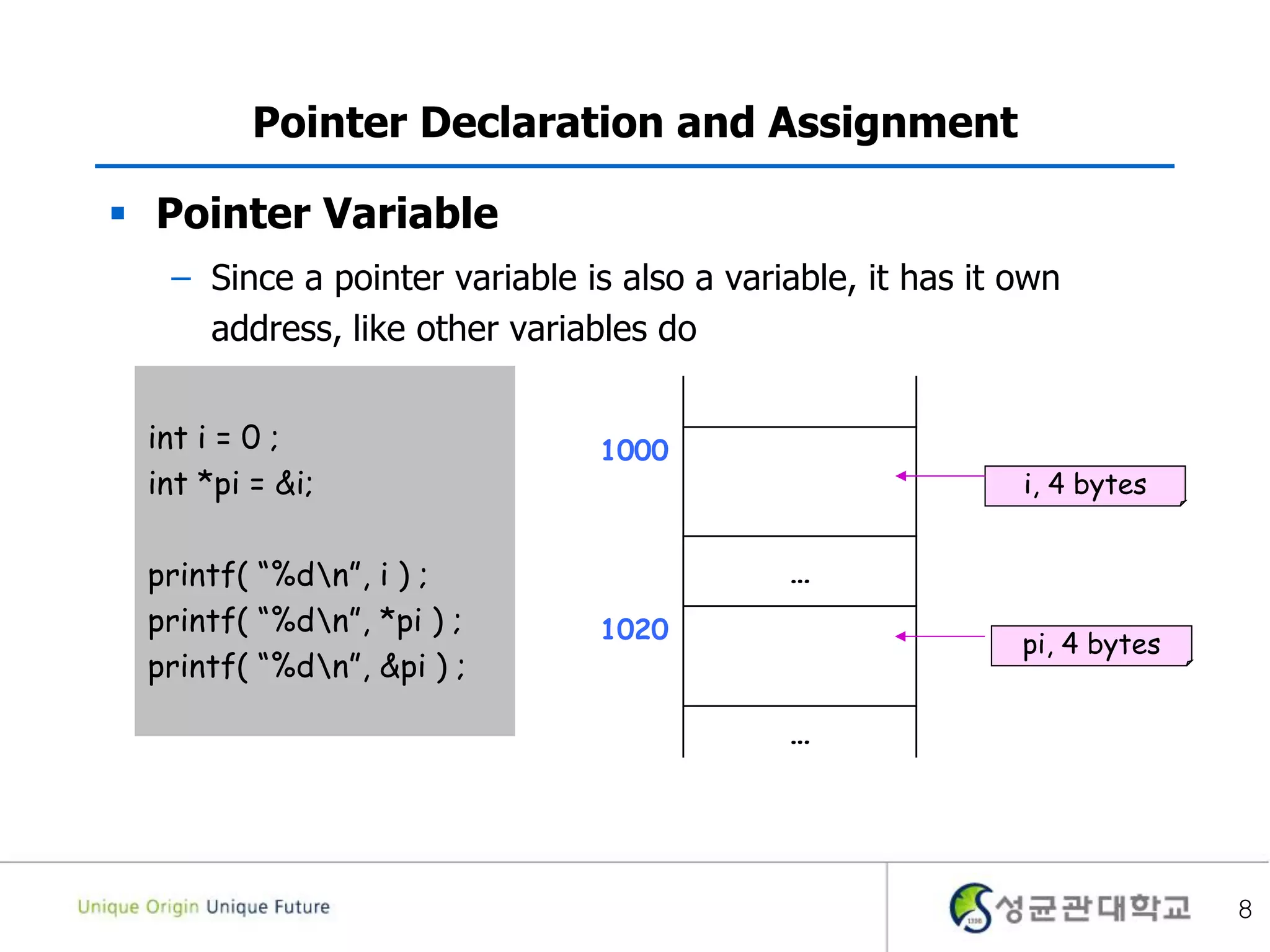
![ Example
9
Pointer Declaration and Assignment
[Ex] int *p;
int month=3;
p = &month;
Assign the address of ‘month’
to pointer variable
p month
3
p
1000
month
31000
Use an arrow instead of
writing address in a
pointer variable](https://image.slidesharecdn.com/9-pointerpointerfunction-130428233947-phpapp02/75/9-pointer-pointer-function-9-2048.jpg)
![ Example
10
Addressing and Dereferencing
[Ex] int a, b;
int *p;
a = b = 7;
p = &a;
printf(“*p = %dn”, *p);
*p = 3;
printf(“a = %dn”, a);
*p == 7
The variable pointed by p, that is a
The variable pointed by p, a, has 3
assign the address of a to p
*p = 7
a = 3](https://image.slidesharecdn.com/9-pointerpointerfunction-130428233947-phpapp02/75/9-pointer-pointer-function-10-2048.jpg)
![11
Addressing and Dereferencing
[Ex1] int a, b;
int *p;
a = b = 7;
p = &a;
*p = 3;
p = &b;
*p = 2 * *p – a;
pa
7
b
7
p
3
a b
7
pa
3 11
b
Example](https://image.slidesharecdn.com/9-pointerpointerfunction-130428233947-phpapp02/75/9-pointer-pointer-function-11-2048.jpg)
![ Prone to error
12
Addressing and Dereferencing
[Ex1] int x, *p;
x = 10;
*p = x;
[Ex3] int x, *p;
x = 10;
p = x;
Error!!
Can’t assign value x to pointer p
because p is not initialized.
We don’t know where p points
Error!!
Can’t assign value x to pointer p
because p cannot hold an integer variable](https://image.slidesharecdn.com/9-pointerpointerfunction-130428233947-phpapp02/75/9-pointer-pointer-function-12-2048.jpg)
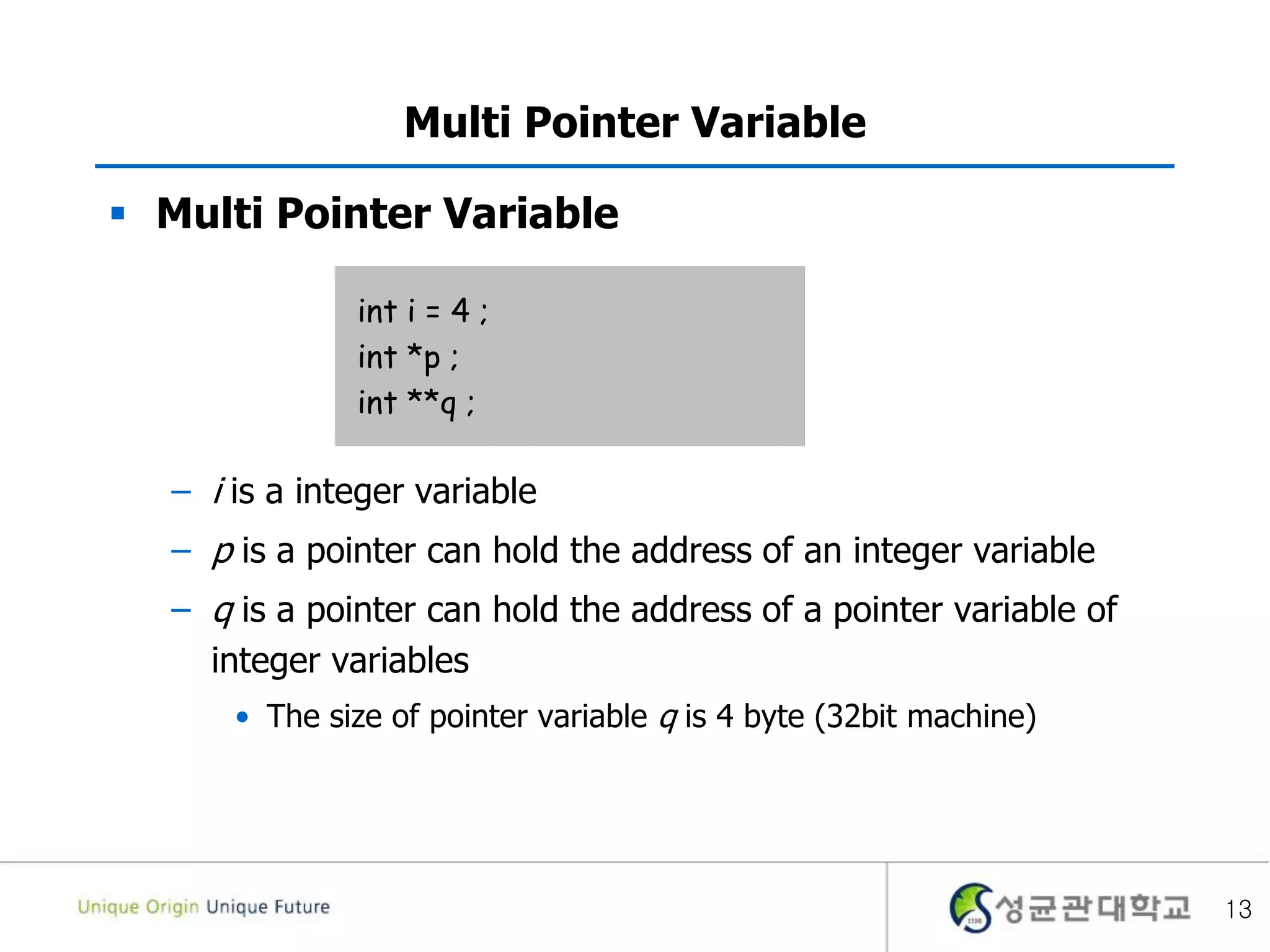
![ Example
14
Pointer Declaration and Assignment
[Ex] int i = 3;
int *p ;
int **q ;
p = &i ;
q = &p ;
p i
3
i
31000
p
10002000
q
20003000
q](https://image.slidesharecdn.com/9-pointerpointerfunction-130428233947-phpapp02/75/9-pointer-pointer-function-14-2048.jpg)
![ Example:
– What are the values of i and j,
respectively?
– Assume that the addresses of i,
j, p and q are 1000, 2000, 3000
and 4000, respectively.
– What are the values of p, q, r?
15
Pointer Declaration and Assignment
[Ex] int i = 3, j = 2;
int *p, *q ;
int **r ;
p = &i ;
q = &j ;
r = &p ;
*p = 4 ;
*q = 5 ;
**r = 6 ;
*r = &q ;
q =&i ;
**r = 7 ;](https://image.slidesharecdn.com/9-pointerpointerfunction-130428233947-phpapp02/75/9-pointer-pointer-function-15-2048.jpg)
![ Example
16
Swap Function
[Ex]
void swap(int i, int j) {
int temp = i ;
i = j;
j = temp;
}
int main(void) {
int a=3, b=7;
printf(“before swap : %d %dn”, a, b);
swap( a, b );
printf(“after swap : %d %dn”, a, b);
}
Can it swap values of a and b?](https://image.slidesharecdn.com/9-pointerpointerfunction-130428233947-phpapp02/75/9-pointer-pointer-function-16-2048.jpg)
![ Example
17
Swap Function
[Ex]
void swap(int *p, int *q) {
int temp = *p ;
*p = *q;
*q = temp;
}
int main(void) {
int a=3, b=7;
printf(“before swap : %d %dn”, a, b);
swap(&a, &b);
printf(“after swap : %d %dn”, a, b);
}
before swap : 3 7
after swap : 7 3](https://image.slidesharecdn.com/9-pointerpointerfunction-130428233947-phpapp02/75/9-pointer-pointer-function-17-2048.jpg)
![ Swap values of two pointer variables
18
Swap Function
[Ex]
void swap(int **pp, int **qq) {
int *temp = *pp ;
*pp = *qq;
*qq = temp;
}
int main(void) {
int a=3, b=7;
int *p = &a, *q = &b ;
printf(“before swap : %d %dn”, *p, *q);
swap(&p, &q);
printf(“after swap : %d %dn”, *p, *q);
}
before swap : 3 7
after swap : 7 3](https://image.slidesharecdn.com/9-pointerpointerfunction-130428233947-phpapp02/75/9-pointer-pointer-function-18-2048.jpg)
